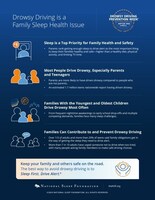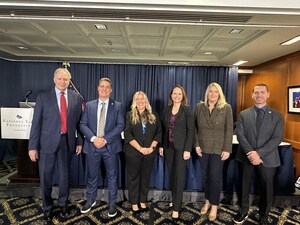
But, parents are more likely to have driven drowsy
WASHINGTON, Oct. 30, 2025 /PRNewswire/ -- Ahead of Drowsy Driving Prevention Week® (Nov. 2 – 8), the National Sleep Foundation (NSF) today released the results of a new study revealing drowsy driving as a widespread family sleep health issue. The data show that over 60% of U.S. adults have driven drowsy, with rates approaching 70% among parents, and the more children in a household, the higher the risk.
Drowsy driving is impaired driving. Like drunk, drugged, and distracted driving, drowsy driving is a significant threat to road safety. Data from the AAA Foundation for Traffic Safety show drowsy driving is responsible for one out of every five deadly motor vehicle crashes.
National Sleep Foundation's 2025 Drowsy Driving Survey was fielded as part of Drowsy Driving Prevention Week®, NSF's annual campaign to help Americans get the sleep they need and reduce the number of drivers who get behind the wheel while sleep-deprived. NSF urges everyone to Sleep First. Drive Alert.®
Key findings from the research include:
- Parents rank getting enough sleep to drive alert as the most important thing to keep their families healthy and safe, higher than a healthy diet, physical activity and limiting TV time.
- Parents are more likely to have driven drowsy compared to people who don't have children.
- An estimated 1.7 million teens nationwide report having driven drowsy.
- Families with infants and those with teens drive drowsy most often.
- Over 1/3 of adults and more than 20% of teens said family obligations get in the way of getting the sleep they need to drive alert.
"Our new data reveal that drowsy driving isn't just an individual behavior, it's a family sleep health issue," said Joseph Dzierzewski, PhD, Senior Vice President of Research and Scientific Affairs at NSF. "Parents juggling multiple children's schedules, early school drop-offs, and extracurriculars face unique sleep challenges that put them at higher risk. Meanwhile, their teenage children, already new to driving, are getting behind the wheel sleep-deprived from balancing school, work, and social demands. This creates a dangerous situation for entire households and communities."
However, families can also be a powerful force for prevention. More than 7 in 10 U.S. adults (72%) have urged someone not to drive when too tired, with family members being the most common recipients of these interventions.
"We believe families hold the key to preventing drowsy driving," said John Lopos, NSF CEO. "By prioritizing sleep, communicating openly about sleep needs, and holding each other accountable, families can create a household culture that values sleep as essential to safety. Getting the sleep you need to be your Best Slept Self® can help keep you and your loved ones safe on the road."
Steps families can take to help prevent drowsy driving include:
- Get the recommended amount of sleep. NSF recommends seven to nine hours of sleep per night for most adults and eight to 10 hours for teens of driving age.
- Plan activities together to minimize negative impacts on sleep. Coordinate schedules to reduce early morning commitments when possible.
- Communicate openly about sleep needs and barriers. Make sleep a regular part of family conversations.
- Hold each other accountable. Don't hesitate to speak up when a family member seems too tired to drive.
- Be mindful of the warning signs of drowsy driving. Frequent blinking, yawning, or difficulty with lane and speed control are common signs.
As part of its Drowsy Driving Prevention Week activities, NSF will host a Drowsy Driving Prevention Expert Safety Panel in Washington, D.C. on November 6, 2025, bringing together leading experts to discuss the latest research, intervention strategies, and policy solutions. Click here for more information and to register for this local in-person event.
NSF independently produces Drowsy Driving Prevention Week and all related official educational content. Drowsy Driving Prevention Week 2025 sponsors include Waymo, Mazda, and Higi. Visit the NSF website to see a full list of collaborators for the 2025 Drowsy Driving Prevention Week campaign, including MADD, the Autonomous Vehicle Industry Association, National Alliance to Stop Impaired Driving, and the Governors Highway Safety Association.
Join NSF to help prevent drowsy driving by sharing campaign messages on social media using the hashtag #SleepFirst. NSF's drowsy driving prevention resources, including the full study report, are available on www.theNSF.org.
About the National Sleep Foundation
There's only one National Sleep Foundation (NSF). NSF is an independent nonprofit organization dedicated to improving health and well-being through sleep education and advocacy. Founded in 1990, the NSF is committed to advancing excellence in sleep health theory, research and practice. In its 35 years, NSF has promoted sleep health through expert recommendations, consensus guidelines, tech standards, and easy-to-use tips and tools to improve sleep.
SOURCE National Sleep Foundation









Share this article